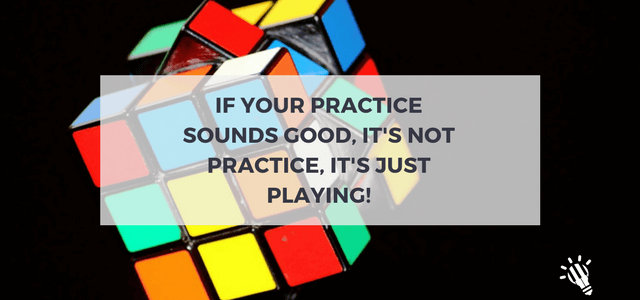Last night at my student’s mid-year recital I reminded all my students and their parents that practice, if effective and done properly, should not sound “nice” all that often.
Why? One simple reason. For students to push themselves to learn harder pieces and conquer new technical difficulties, their practice will necessarily sound pretty bad more often that it sounds good, because they are trying to do things that they can’t already do. If a student’s practice is always sounding nice, they are probably just playing what they already know and they won’t be achieving anything new.
A message for parents: please don’t call out to your child every time they play a bung note!! As long as they are trying something new, this is a good thing. The only time you should step in with regard to hearing something that’s not right, is if your child is clearly unaware that what they are playing is wrong.
For students: if your practice is always sounding “nice” because you fear what the rest of your household will say or, even worse, you only play what you already know, then guess what? YOU’RE NOT PRACTISING, you’re wasting your time!
Practice must be deliberate. What you should be doing is “zooming-in” like Google Earth and totally ripping apart all your pieces to find the problems in them. You should then focus solely on a tricky bit that you can’t play properly. Working like this is likely to sound pretty bad until you get it; that’s just how practice should sound!! Same goes for all your technical work: playing scales mindlessly up and down the piano while you think about the weekend is a waste of time.
Remember it’s not about time, it’s about quality.
Only when you’ve done enough work on a piece and you can successfully play it through without hesitation, should you just be playing it through as practice. This is the sort of thing that you should be doing a few weeks out from a performance or exam – getting used to performing (not practising) your pieces, polishing the interpretation, refining your playing.
I encourage all my students to perform their works as many times as possible before recitals and exams, even if this is just at home with family, at school for a class, in front of your teacher, at a masterclass – anything really to help get used to performing under pressure. Only then will the real thing (ie. the solo recital or exam) seem just that little bit more comfortable.
Good luck with your practice!! I’m off to do some of my own…and it definitely WON’T sound good!!

timtopham says:
Thanks for your feedback, Fran and yes, I agree…perhaps a better title would have been, “If your piano practice ALWAYS sounds good…” 🙂
crosseyedpianist says:
Hi Tim
I agree with almost everything in this post, but I would counter that when a student has been assigned a piece or part of a piece which requires very beautiful cantabile playing, they should be striving for that beautiful sound during practice.
Fran
http://www.crosseyedpianist.wordpress.com
Coloured Silence says:
No worries, it was a pleasure to read. I keep a music blog, too http://colouredsilence.wordpress.com if you are interested you care welcome to check it out and leave a thought or two if you have any.
Rebecca
Coloured Silence says:
Nice post… a truth that my dad still can’t understand. The other night, over the dinner table he said “I don’t understand why people would want to take (piano) lessons from you, you can’t play, when you practice, you play the same thing over and over again and it’s been like this for years!” It’s hard to explain it to him even after all these years that practice is MEANT to sound bad … you articulate it so well in this article! Now to get my old man to read it…
timtopham says:
Thanks for your feedback, Coloured Silence. It’s always great to hear when a post resonates with other pianists and teachers 🙂 Please feel free to send onto anyone else who may be interested. All the best, Tim.